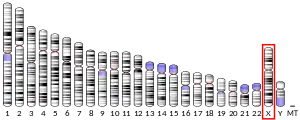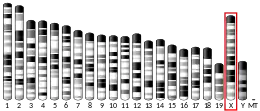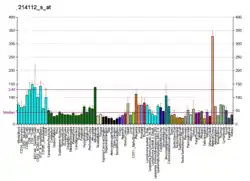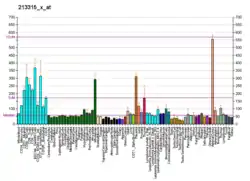CXorf40A
Protein CXorf40A is a protein that in humans is encoded by the CXorf40A gene.[5][6][7][8]
| EOLA1 | |||||||||||||||||||||||||||||||
|---|---|---|---|---|---|---|---|---|---|---|---|---|---|---|---|---|---|---|---|---|---|---|---|---|---|---|---|---|---|---|---|
| Identifiers | |||||||||||||||||||||||||||||||
| Aliases | EOLA1, CXorf40, FLJ16423, chromosome X open reading frame 40A, CXorf40A, endothelium and lymphocyte associated ASCH domain 1 | ||||||||||||||||||||||||||||||
| External IDs | OMIM: 300954 MGI: 1915868 HomoloGene: 12274 GeneCards: EOLA1 | ||||||||||||||||||||||||||||||
| |||||||||||||||||||||||||||||||
| |||||||||||||||||||||||||||||||
| |||||||||||||||||||||||||||||||
| Wikidata | |||||||||||||||||||||||||||||||
| |||||||||||||||||||||||||||||||
References
- GRCh38: Ensembl release 89: ENSG00000197620 - Ensembl, May 2017
- GRCm38: Ensembl release 89: ENSMUSG00000045237 - Ensembl, May 2017
- "Human PubMed Reference:". National Center for Biotechnology Information, U.S. National Library of Medicine.
- "Mouse PubMed Reference:". National Center for Biotechnology Information, U.S. National Library of Medicine.
- Timms KM, Lu F, Shen Y, Pierson CA, Muzny DM, Gu Y, Nelson DL, Gibbs RA (Oct 1996). "130 kb of DNA sequence reveals two new genes and a regional duplication distal to the human iduronate-2-sulfate sulfatase locus". Genome Res. 5 (1): 71–8. doi:10.1101/gr.5.1.71. PMID 8717057.
- Timms KM, Bondeson ML, Ansari-Lari MA, Lagerstedt K, Muzny DM, Dugan-Rocha SP, Nelson DL, Pettersson U, Gibbs RA (May 1997). "Molecular and phenotypic variation in patients with severe Hunter syndrome". Hum Mol Genet. 6 (3): 479–86. doi:10.1093/hmg/6.3.479. PMID 9147653.
- Cai Z, Liang ZW, Luo XD, Yang ZC, Sun RJ, Su YY (Dec 2005). "[Purification of human endothelial overexpressed lipopolysaccharide-associated factor 1 protein]". Zhonghua Shao Shang Za Zhi. 21 (5): 367–9. PMID 16383041.
- "Entrez Gene: CXorf40A chromosome X open reading frame 40A".
External links
- Human CXorf40A genome location and CXorf40A gene details page in the UCSC Genome Browser.
Further reading
- Ross MT, Grafham DV, Coffey AJ, et al. (2005). "The DNA sequence of the human X chromosome". Nature. 434 (7031): 325–37. Bibcode:2005Natur.434..325R. doi:10.1038/nature03440. PMC 2665286. PMID 15772651.
- Liang Z, Yang Z (2005). "Identification and characterization of a novel gene EOLA1 stimulating ECV304 cell proliferation". Biochem. Biophys. Res. Commun. 325 (3): 798–802. doi:10.1016/j.bbrc.2004.10.124. PMID 15541360.
- Gerhard DS, Wagner L, Feingold EA, et al. (2004). "The status, quality, and expansion of the NIH full-length cDNA project: the Mammalian Gene Collection (MGC)". Genome Res. 14 (10B): 2121–7. doi:10.1101/gr.2596504. PMC 528928. PMID 15489334.
- Ota T, Suzuki Y, Nishikawa T, et al. (2004). "Complete sequencing and characterization of 21,243 full-length human cDNAs". Nat. Genet. 36 (1): 40–5. doi:10.1038/ng1285. PMID 14702039.
- Strausberg RL, Feingold EA, Grouse LH, et al. (2003). "Generation and initial analysis of more than 15,000 full-length human and mouse cDNA sequences". Proc. Natl. Acad. Sci. U.S.A. 99 (26): 16899–903. Bibcode:2002PNAS...9916899M. doi:10.1073/pnas.242603899. PMC 139241. PMID 12477932.
- Hinz T, Allam A, Wesch D, et al. (2000). "Cell-surface expression of transrearranged Vgamma-cbeta T-cell receptor chains in healthy donors and in ataxia telangiectasia patients". Br. J. Haematol. 109 (1): 201–10. doi:10.1046/j.1365-2141.2000.01962.x. PMID 10848801.
This article is issued from Wikipedia. The text is licensed under Creative Commons - Attribution - Sharealike. Additional terms may apply for the media files.






